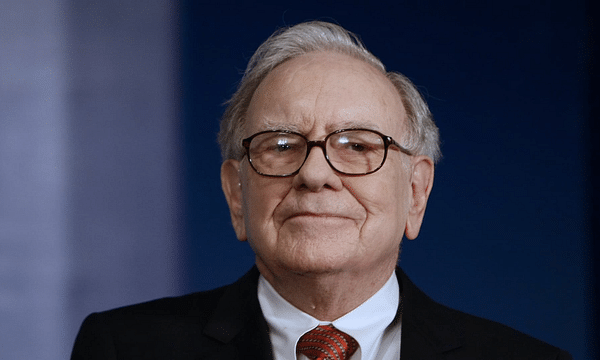Berkshire has made huge changes to its portfolio, focusing primarily on one sector
Warren Buffett and his Berkshire Hathaway are icons of investing with a long-term horizon. Buffett is known for his ability to identify undervalued stocks of companies with solid fundamentals, which attracts investor attention on those days when Form 13Fs are released so we can look at his buying and selling.

Warren Buffett reduced his exposure to two other banks last quarter when he bought new shares of Capital One $COF. Capital One is a bank that specializes in credit cards and auto loans.
Capital One began offering its first credit cards in 1996 and has met with great success. It gradually expanded its product portfolio and gained more customers. A big boost came when it partnered with celebrities such as Samuel L. Jackson, who appeared in its advertising campaign.
In the following years, Capital One successfully expanded into other areas, and in 2017, it bought the retail chain Cabela's, becoming the eighth largest bank in the U.S. Despite its growth, however, it continues to focus primarily on consumer loans and credit cards, which it has conquered the market with.
The billionaire's investment conglomerate Berkshire Hathaway $BRK-A sold $1.4 billion of its remaining stakes in depository bank Bank of New York Mellon $BK and Minneapolis regional US Bancorp $USB.
They are the last of its long-term bank bets to be cut. The Oracle of Omaha sold off much of Berkshire's holdings in U.S. banks between 2020 and 2022, some just months before the banking system turmoil that began in mid-March.
Buffett has played the role of savior to a number of institutions over the decades, including the 2008 financial crisis. But he has not yet emerged as a white knight for any banks in trouble during this current crisis, at least in any way that has been made public so far.
Financial stocks
First, Buffett was serious about staying at Bank of America $BAC. The conglomerate added 22.8 million shares (with a market value of about $615 million) to its stake in Bank of America in the first quarter, bringing its ownership stake to more than 12.9%.
Buffett focused on financial stocks in the quarter. For example, Berkshire added $954 million to Capital One (COF) and slightly reduced its stake in Ally Financial $ALLY. The conglomerate also sold $1.1 million of Jefferies Financial Group $JEF.
Returning to Ally, Berkshire slightly reduced its investment in Ally Financial and sold about 2% of its shares of the financial company, which primarily focuses on the automotive industry. It should be noted, however, that Berkshire owns more than 9.6% of Ally, and since the bank frequently buys back its own shares, this could have been a move to ensure that the conglomerate's position stays below the 10% level at which regulations begin to fall away for stakeholders.
Berkshire also disclosed a $41.3 million stake in Diageo Plc $DEO, makers of alcoholic beverages including Johnnie Walker and Guinness, in a 13F filing.
Meanwhile, Buffett's company was mostly a seller of shares in the quarter, buying $2.87 billion and selling $13.28 billion.
Apple $AAPL remains Berkshire's largest stock holding. Buffett said at the recent annual meeting that it's "better than any business" that Berkshire directly owns. He added that the loyalty of the iPhone's customer base makes it an "extraordinary product."
However, as expected, the billionaire sold shares of Chevron $CVX and General Motors Co. $GM, whose Berkshire holdings were cut by 20% and 19%, respectively.
Speculation is also rife that Buffett's Berkshire is continuing and will continue to accumulate shares of $OXY, despite Buffett's recent comments that he will not buy the entire company (it should go shopping between May 11 and 12).
More OXY purchases have been made this week, and speculation further suggests that Buffett may not plan to buy all of OXY, but could nevertheless come close to buying up to 40% of the company.
Another change we see in RH - Shares of $RH fell more than 8% on Tuesday after a 13F filing from Berkshire Hathaway revealed that Warren Buffett sold his entire stake in the luxury home accessories company last quarter.
Berkshire first bought RH stock in the third quarter of 2019, when the stock was trading in a range of about $110 to $160.
The stake grew after other purchases until the conglomerate amassed 2.36 million shares of the company worth about $575 million at the end of the first quarter.
Despite the steep decline and negative developments, however, Buffett's Berkshire likely made a modest profit on its stake because it bought most of its position for less than $200 a share.
If we look at even the smallest trades, we can see really small increases in the $PARA and Vitesse Energy $VTS positions.
Vitesse Energy is an independent energy company engaged in oil and gas exploration and production. It was founded in 1993 and is based in Calgary, Canada. Its main areas of interest are the exploration and production of unconventional hydrocarbon resources such as shale gas, coal bed methane and heavy oil. Vitesse Energy is one of the pioneers in the shale gas industry in North America.
- What do you think of the changes to Berkshire's portfolio?
Please note that this is not financial advice.
I'm glad for that $OXY. I also have it and I was buying on the dip. So hopefully they see nice potential there. 😊
The changes are great! The Apple buyout (again) is a one-of-a-kind stock. Banks are getting out of the rut and making room for $OXY. Good thing they won't end up buying them all. That could turn Buffett into an oil "sheik" :)